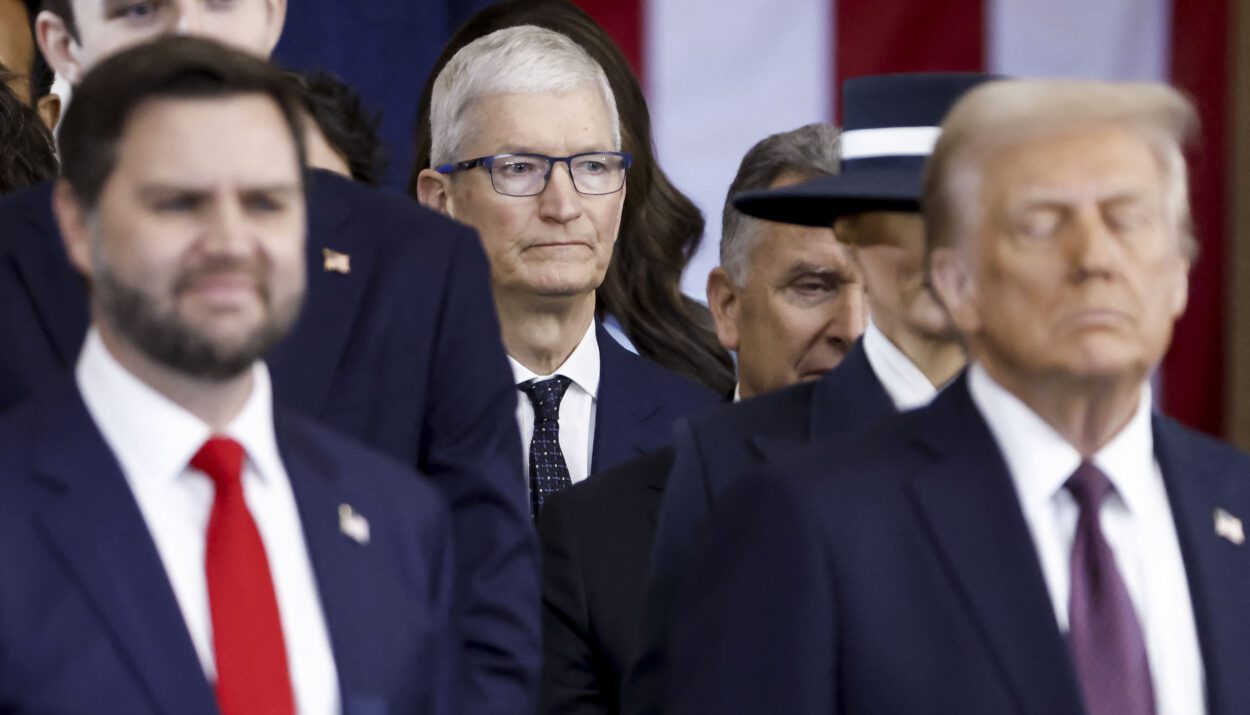As Apple expands iPhone production in India and eyes AI partnerships in China, the tech giant has found itself at the center of a global firestorm — caught between pressure from the U.S. government, political nationalism, and geopolitical risks. US President Donald Trump and U.S. lawmakers are turning up the heat on Apple CEO Tim Cook, questioning both the company’s commitment to American manufacturing and its cooperation with Chinese tech firms like Alibaba.
Trump to Tim Cook: “I Don’t Want You Building in India”
At a business roundtable in Doha on May 15, Trump made headlines after revealing a tense exchange with Apple’s CEO:
“I had a little problem with Tim Cook yesterday,” Trump said.
“I said, ‘Tim, you’re my friend. But now I hear you’re building all over India. I don’t want you building in India. You can build in India if you want to take care of India — but we’re not interested in you building there if you’re selling to the U.S.’”
Trump, who has previously championed tariffs and reshoring of U.S. manufacturing, took issue with Cook’s May 2 announcement that most iPhones sold in the U.S. this quarter would be assembled in India.
He added,
“We put up with all the plants you built in China for years… We’re treating you really good, Tim.”
Trump’s frustration comes amid trade friction between the U.S. and India, which he described as “one of the highest-tariff nations in the world.”
Apple’s Response: “India Plans Are Intact”
In response to Trump’s remarks, Apple quietly assured Indian officials that nothing has changed. According to PTI:
“Apple has said that its investment plans in India are intact and it proposes to continue to have India as a major manufacturing base for its products.”
Apple’s shift to India isn’t just symbolic—it’s strategic. In FY25 alone:
- $22 billion worth of iPhones were assembled in India
- Over 3 million units were exported to the U.S. in March
- India now accounts for ~15% of global iPhone output
- Around 200,000 jobs have been created in the Apple ecosystem
Apple partners with Foxconn, Tata Electronics, and others to produce models across its entire iPhone lineup in India—including Pro models.
“India isn’t just an alternative to China—it’s now central to Apple’s global supply chain,” said a Bloomberg analyst.
Apple’s AI Deal With Alibaba Alarms US Officials
Meanwhile, Apple is under new scrutiny in Washington over reports that it may partner with Alibaba to bring its AI features—branded “Apple Intelligence”—to Chinese iPhones.
According to The New York Times, the deal is seen as necessary for Apple to stay competitive in China, where it faces growing pressure from local rivals like Xiaomi and Huawei. But U.S. lawmakers are deeply concerned.
“There are serious concerns that this partnership will help Alibaba collect data to refine its AI models,” said Rep. Raja Krishnamoorthi, the top Democrat on the House Intelligence Committee.
“It also lets Apple turn a blind eye to the rights of Chinese users.”
Apple is said to be in talks not only with Alibaba, but also with Tencent, DeepSeek, and Baidu to ensure iPhone 17’s AI features work in China under local law. However, such partnerships may require Apple to comply with Chinese data-sharing and censorship mandates.
“It’s an AI arms race,” said Greg Allen from the Center for Strategic and International Studies.
“And American companies shouldn’t be giving Chinese firms an advantage.”
US May Block Alibaba and Others
The backlash is growing in Washington. Sources told AppleInsider that U.S. officials have contacted Apple executives about the nature of these AI partnerships. There is also talk of adding Alibaba and similar firms to the Commerce Department’s restricted list, which would block U.S. companies from working with them.
The Bigger Picture: Balancing Business and National Pressure
Apple is trying to balance three competing pressures:
- Manufacture less in China, but doing so is politically risky.
- Expand in India, but now it’s drawing criticism from Trump.
- Bring AI to China, but that could come with security and ethical tradeoffs.
According to Counterpoint’s Tarun Pathak:
“This is a familiar Trump tactic. He wants to push Apple to build more in the U.S.—but that can’t happen overnight. Manufacturing iPhones in America is far more expensive than in India.”
Even if Apple wanted to move more manufacturing to the U.S., it would be limited by labor costs, supply chain gaps, and infrastructure.
Labor cost index (est.):
| Country | Cost | Ecosystem | iPhone Output |
|---|---|---|---|
| China | Low to Medium | High | ~80% |
| India | Low | Growing fast | ~15% |
| USA | High | Low for electronics | <1% |
Final Word: Apple Isn’t Backing Down
Despite political pressure, Apple appears firm in its plans:
- India will continue to be a primary manufacturing base
- The company will keep exploring China AI options—but under scrutiny
- It remains committed to global scale, efficiency, and diversification
For Apple, it’s a delicate dance between innovation and diplomacy.
As one executive put it:
“We build where it makes the most sense—for the product, the price, and the customer.”
Disclosure: This article does not represent investment advice. The content and materials featured on this page are for educational purposes only.
Related:
US and EU break impasse to enable tariff talks
China Tightens Control Over AI Data Centers
Trump: US will set new tariff rates, bypassing trade negotiations
Sundar Pichai Interview on AI, Search, and Future of Google
Billionaire Investors Reveal Q1 2025 Portfolio Moves: Buffett, Ackman, Tepper, Burry & More
Trump & US Executives Lock In Over $1 Trillion in Middle East Deals
Qatar Buys 160 Boeing Jets as Trump Accepts $400M Gift Jet
Elon Musk, Robotaxis, and Starlink: Inside Multi-Billion Dollar US–Saudi Tech Power Play
Nvidia’s Partnership With Saudi Arabia Opens a New Frontier in Global AI
Trump Secures $600 Billion Saudi Investment in US Tech, Energy, and AI
US Drug Price Revolution Begins: Trump Targets 30–80% Cuts
US and China announce deal to cut reciprocal tariffs for 90 days










